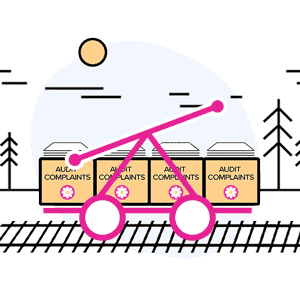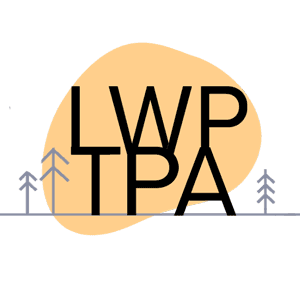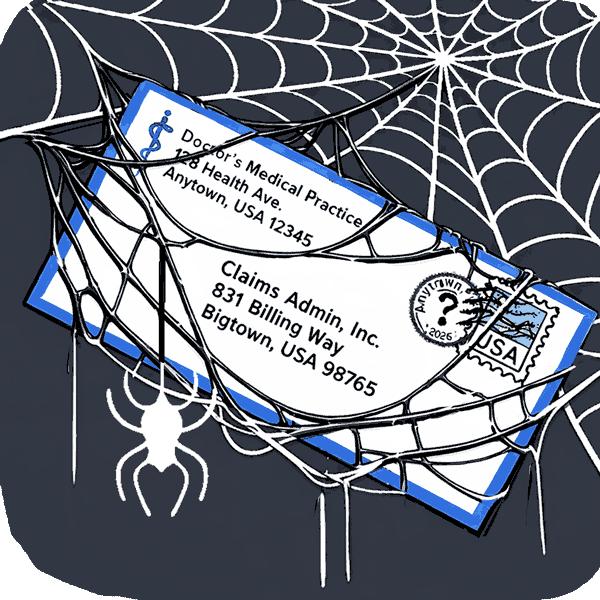LWP Invalid 277 ACKs: Non-Compliant Rejections for Second Review Appeals - 102 Audit Complaints

Third-Party Administrator (TPA) LWP Claims Solutions is in violation of California workers’ comp e-billing law. LWP’s persistent failure to honor state requirements places an undue burden on medical practices, and defeats the purpose of e-billing, which was designed to make workers’ comp more efficient and facilitate the treatment of injured workers.
Below, see the details of the latest batch of formal Audit Complaints daisyBill submitted to the Division of Workers’ Compensation, on behalf of our clients and all California providers who choose to treat injured workers.
LWP: Ignoring CA Law
To: XXXXXXXX@dir.ca.gov
Subject: #4 LWP Invalid 277 ACKs: Noncompliant Rejections for Second Reviews - 102 Audit Complaints
For California workers’ compensation EDI transactions the Division of Workers’ Compensation (DWC) issued a comprehensive Electronic Medical Billing and Payment Companion Guide that lists EDI requirements that providers and payers must follow.
LWP fails to adhere to 277 ACK requirements mandated by the DWC.
EDI Noncompliance: For 102 Second Review sent electronically, Data Dimensions (the clearinghouse vendor representing LWP) sent providers 102 invalid 277 ACKs. Each 277 ACK rejected the e-bill and denied payment for the Second Review appeal.
LWP failed to issue an Explanation of Review (EOR) explaining the payment denial. Without an EOR, the provider cannot appeal the denied reimbursement with Independent Bill Review.
Since Data Dimensions does not forward the rejected Second Review e-bills to LWP, this EDI noncompliance results in a significant administrative cost for providers as follow:
- In addition to the cost incurred to submit the Second Review e-bill that Data Dimensions rejected, providers incur an additional cost to resend a duplicate paper Second Review appeal to LWP.
Below we offer extensive evidence documenting how LWP and its clearinghouse act in tandem to ignore California EDI 277 Acknowledgement requirements.
277 ACK: STC Category-Code Noncompliance Explained - Second Review e-Bills
Per Chapter 9 Companion Guide Acknowledgments, when a provider transmits an e-bill to a payer (or the payer’s clearinghouse), within two working days of receipt of an e-bill, the payer must send the provider an ASC X12N/005010X214 Health Claim Acknowledgment (277) advising either the e-bill was accepted or rejected for payment adjudication.
- This e-bill processing step, prior to adjudication, is to verify that the bill concerns an actual employment-related condition that has been reported to the employer and subsequently reported to the claims administrator.
For the period 1/1/2022 through 7/31/2022, for 102 Second Review e-bills submitted to LWP, the clearinghouse Data Dimensions
- Sent the provider a timely 277 Acknowledgment accepting the e-bill for processing with a Claim Status Category Code and Claim Status Code as follows:
- A1 - The bill has been received.
- 20 - Accepted for processing.
- Sent the provider an untimely 277 Acknowledgment rejecting the Second Review e-bill for processing with one of the non-compliant STC Category-Codes payment denial reasons listed in Table A.
In each instance, the provider submitted the Second Review appeal to dispute a payment amount; therefore, Data Dimensions should not issue a 277 Acknowledgment rejecting the Second Review. Since LWP processed the original bill, the Second Review represents an actual employment-related condition that has been reported to the employer and subsequently reported to the claims administrator.
Table A: 277 ACK: Noncompliant STC Category-Code Reject Second Review e-Bills
Submission Type |
277 ACK: STC Category-Code (Current) |
277 STC Reject Description (Current) |
Bill Count |
Second Review |
A3-137 |
Entity's plan network id. Usage: This code requires use of an Entity Code. |
1 |
A3-364 |
Is accident/illness/condition employment related? |
1 |
|
A3-46 |
Internal review/audit. |
1 |
|
A3-54 |
Duplicate of a previously processed claim/line. |
1 |
|
A6-629 |
Property Casualty Claim Number |
98 |
|
Second Review Total |
102 |
CSV: Invalid 277 ACKs - Noncompliant Rejections for Second Reviews - Attached is a CSV listing 102 e-bills daisyBill providers submitted to LWP where LWP failed to accept the Second Review sent in the X12 837 format. The table below indicates the relevant CSV columns demonstrating the following:
- Column O: 277 ACK Receipt Due Date - Two working days after Data Dimensions received e-bill,
- Columns P & Q: Receipt Date of the initial 277 ACK accepting the e-bill,
- Columns S & T: Receipt Date of the subsequent untimely 277 ACK rejecting the same e-bill
- Column U: Non-compliant STC Category-Code sent rejecting the e-bill, and
- Column AW: STC Reject Description
Column O |
277 ACK: Receipt Due Date |
2022-02-22 |
Column P |
277 ACK: Receipt Date (First Accept/Reject) |
2022-02-18 |
Column Q |
277 ACK: Type (First Accept/Reject) |
Accept |
Column R |
277 ACK: STC Category-Code (First Accept/Reject) |
A1-20 |
Column S |
277 ACK: Receipt Date (Current) |
2022-02-24 |
Column T |
277 ACK: Type (Current) |
Reject |
Column U |
277 ACK: STC Category-Code (Current) |
A3-364 |
Column AW |
277 STC Reject Description |
Is accident/illness/condition employment related? |
Audit Complaint Details
This Audit Complaint Data submitted to the DWC represents a credible complaint and credible information of claims handling violations for 102 e-bills submitted to LWP by providers that treat injured workers.
Effective October 2012, DWC Rule 7.1 requires the claims administrator to accept workers’ comp e-bills from providers in the X12 837 format.
Noncompliance: Per Chapter 9 Companion Guide Acknowledgments, when a provider transmits an e-bill to a payer (or the payer’s clearinghouse), within two working days of receipt of an e-bill, the payer must send the provider an ASC X12N/005010X214 Health Claim Acknowledgment (277) to advising either the e-bill was accepted or rejected for payment adjudication.
The claims administrator sent an untimely 277 ACK rejecting e-bills submitted between 1/1/2022 and 7/31/2022. Rather than issuing an Explanation of Review (EOR) with payment denials, LWP rejected these Second Review e-bills.
Per Chapter 7 of the Medical Billing and Payment Guide, a clearinghouse may issue a rejected 277 Acknowledgement for the following seven reasons:
- Invalid form or format – indicate which form should be used.
- Missing Information – indicate specifically which information is missing by using the appropriate 277 Claim Status Category Code with the appropriate Claim Status Code.
- Invalid data – Indicate specifically which information is invalid by using the appropriate Claim Status Category Code with the appropriate Claim Status Code
- Missing attachments – indicate specifically which attachment(s) are missing.
- Missing required documentation – indicate specifically what documentation is missing.
- Injured worker’s claim of injury is denied.
- There is no coverage by the claims administrator.
CCR §10106.1(c)(3) instructs that the Audit Unit “shall review and compile complaints” that indicate a claims administrator is “failing to meet their obligations under Divisions 1 or 4 of the Labor Code or regulations of the Administrative Director.”
Pursuant to LAB §129, CCR §10106.1(c)(3) provides the DWC Audit Unit may target audit subjects based on: “...credible complaints and/or information received by the Division of Workers' Compensation that indicate possible claims handling violations, except that the Audit Unit will not target audit subjects based only on anonymous complaints unless the complaint(s) is supported by credible documentation.
daisyBill fights the good fight on behalf of workers’ comp providers. Reach out to see how we can help your practice obtain fast, correct reimbursement for treating injured workers.
LET’S TALK
DaisyBill provides content as an insightful service to its readers and clients. It does not offer legal advice and cannot guarantee the accuracy or suitability of its content for a particular purpose.

.png)


.gif)
.png)


